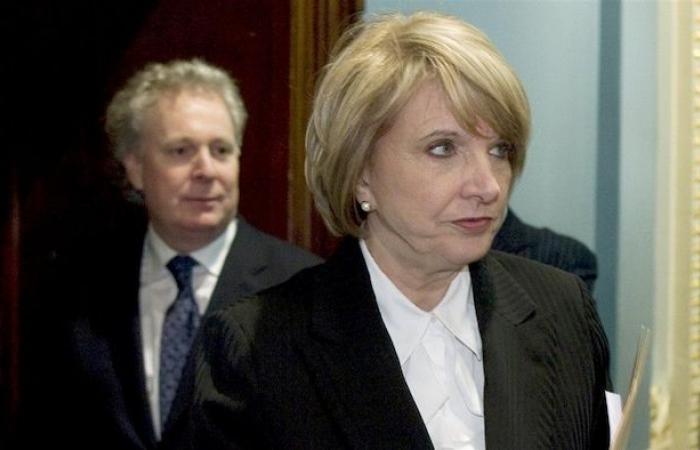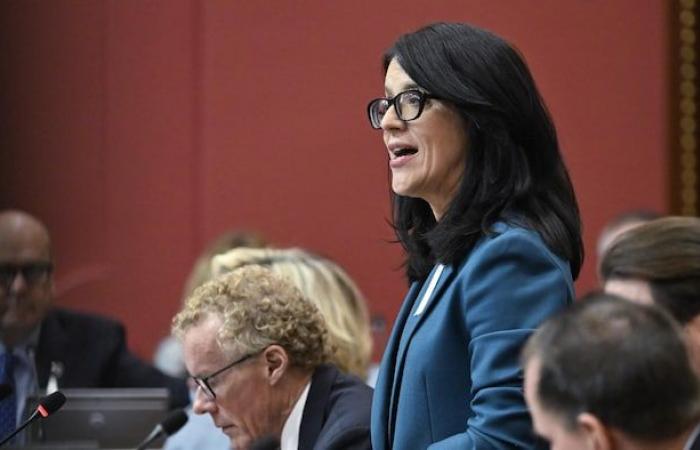Who has passed the most laws over the last quarter of a century in the National Assembly of Quebec? The answer is… Monique Jérôme-Forget, minister in Jean Charest's liberal government for almost six years.
This is what reveals a ranking of Parliament's legislative activity prepared by The Canadian Press with the valuable help of the Library of the National Assembly.
In total, the one who served as President of the Treasury Board, Minister of Finance, Minister of Infrastructure and Minister of Government Services had 37 laws adopted.
I'm stunned!
launched the former elected official, surprised by this statistic.
Maybe I had great talents… now I'm laughing at myself, let's be clear!
she joked, with her own style, in a telephone interview with The Canadian Press from Mexico.
Two other of her liberal colleagues with whom she sat, namely Jean-Marc Fournier and Jacques Dupuis, follow her with 29 laws each, tied.
She is well ahead among the 139 ministers who have had legislative texts ratified over the last 25 years, despite her relatively short career as minister, when she did not quite complete her mandate by resigning in the spring of 2009. .
A studious
Open in full screen mode
Monique Jérôme-Forget, then Minister of Finance of Quebec, and Prime Minister Jean Charest in 2009
Photo: Reuters / Jacques Boissinot
I don't remember it being difficult, but I put in the time, I was studious. I wasn't going on international tours, I was a minister to work. I went to meetings, I was there, I was intense.
How is this possible in just six years, considering that it often takes several months to pass a law?
Among other things, because of her functions: as President of the Treasury Board, she had to have several laws adopted on the budgetary appropriations of departments and agencies after the tabling of the annual budget.
Thus, 12 of the laws she has piloted relate to credits.
But the fact remains that it has brought forward a large number of laws of a financial nature, with tax implications, and affecting retirement plans, among others.
There were lots of technical bills
she explained.
Usually, ministers are not interested in technical bills, but it is important for people who work in government
recalled the one who had been deputy minister of Finance in Ottawa.
My colleagues said: 'another boring affair'. I told them 'yes, it's boring', so they let me do what I wanted. These were important, vital things, but they were technicalities.
We will also remember his Law on the Public-Private Partnership Agency, the famous PPP, which caused so much controversy at the time, because critics saw it as a soft privatization.
Even today, she defends her approach: in a PPPthe partners are obliged to properly maintain the infrastructure for the duration of the contract.
It was for the maintenance of heritage. Politicians don't like to spend money on maintenance, you don't win votes with that. Politicians like to cut ribbons.
Sonia LeBel and Guy Chevrette
Open in full screen mode
Sonia LeBel, President of the Treasury Board
Photo: The Canadian Press / Jacques Boissinot
In the current CAQ government, it is also the holder of the presidency of the Treasury Board who comes closest to the performance of Ms. Jérôme-Forget: Sonia LeBel.
Ms. LeBel has to her credit 28 laws adopted in six years of parliamentary life, including ten on budgetary appropriations.
Former prosecutor of the Charbonneau commission, she was the one who piloted at least three laws which were partly inspired by the conclusions of the commission of inquiry. She also passed a law to accelerate infrastructure projects, in the midst of a pandemic, in addition to numerous other texts on pension plans and collective agreements.
For comparison, two other influential ministers in the CAQ cabinet, Simon Jolin-Barrette and Geneviève Guilbault, added 21 and 10 texts respectively to Quebec's legislative corpus.
This is a notable achievement, considering that these two ministers could not bring to their credit numerous laws on appropriations. Mr. Jolin-Barrette notably brought about the Law on State Secularism and the reform of the Charter of the French Language.

Open in full screen mode
Guy Chevrette, former Minister of Transport for the Parti Québécois
Photo: The Canadian Press / Jacques Boissinot
Over the last quarter of a century, Sonia LeBel finds herself tied with Minister Guy Chevrette, of the Parti Québécois (PQ).
This veteran of Quebec politics, companion of René Levesque, could also have displayed even more eloquent feats of arms if we had taken into account his entire career, which began as an MP in 1976 and as a minister. from 1982.
But, for the purposes of this review, The Canadian Press wanted to focus only on the political history of Quebec since the beginning of this century.
To be more precise, the countdown started from the 36e legislature of March 1999, which followed the elections of November 1998, to avoid counting from 1is January 2000, during his mandate.
In total, no less than 1,103 laws have been adopted by Parliament since March 1999.
Of course, this is not a qualitative analysis of this legislation. In addition, several laws have dozens of pages, or even more than a thousand articles, while others fit on a single page.
Of this sum, female ministers voted for 354, or a little more than a third, which denotes, over the last 25 years, the still relative weight of women in politics.
Lessons: don't be partisan
Did Ms. Jérôme-Forget have her recipe, her tips for moving her bills forward?
The lesson I always give to ministers: make sure you are close to the deputy ministers who work for you, they are very dedicated people
she said about the senior state clerks, who direct the ministry's staff and ensure the interface with political power, the minister and his cabinet.
My officials were gods. […] I have always been surrounded by stars in the public service. […] Sometimes, we will stand up to our officials because we believe in them.
And above all, the former minister warns against one of the natural temptations in parliamentarism: being partisan. According to her, we must avoid this trap and cultivate good relations with elected representatives of the oppositions.
I was never partisan, it tired me, this side of politics; I was friends with everyone
she concludes.
Remember that, in British parliamentarism, the minister submits bills affecting his or her areas of action and guides them through the entire legislative process, that is to say the adoption of the principle, the consultations, the study in parliamentary committee, article by article, until final adoption.
If the government has a majority, adoption is assured… or almost. A government can in fact decide to withdraw a bill or let it die on the order paper if its intentions have changed. Opposition parties can also carry out pugnacious work in parliamentary committees.
With few exceptions, it is not the minister who writes his own bills. Teams of lawyers are working to translate the principles and intentions of the government into articles of law. Once the bill has been tabled in the House and the principle is adopted, amendments can be made in parliamentary committee either by the minister or by opposition deputies.








